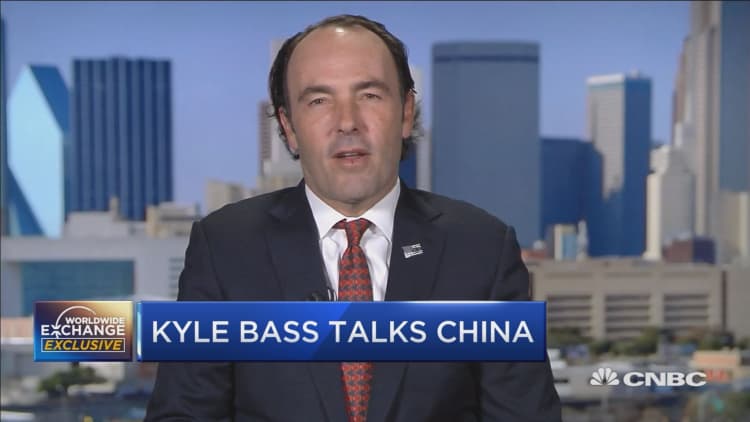
Hayman Capital Management founder Kyle Bass thinks any trade deal with China must include enforcement mechanisms against intellectual property theft for the U.S. to truly benefit from it.
"Over the last decade, they've stolen $2-to-$3 trillion in IP from us. The U.S.' No. 1 asset, in my view, is our ingenuity, our intellectual property, our ability to innovate," Bass told CNBC's Brian Sullivan in an interview that aired Tuesday on "Worldwide Exchange." "That's our game, and they're stealing our game from us. It's really important for this new agreement to be measurable and punishable."
China and the U.S. are in the "final stages" of working out a trade deal, sources told CNBC. However, The New York Times reported Sunday that any deal would do little to address key structural changes in China that the U.S. has been seeking. These changes include a way to enforce intellectual property of U.S. products in China.
"We have a golden opportunity today for a global reset in our relationship with China," Bass said. "Our real issue is forced technology transfers, it's intellectual property theft, it's subversive industrial policies that circumvent WTO rules. It's basically the way the Chinese lie, cheat and steal their way through our economy."
Investors across the globe have been cheering the apparent progress in trade talks between the two countries. The has risen more than 11 percent this year. In China, the Shanghai Composite has surged more than 20 percent, rebounding from a sharp sell-off in 2018.
But Bass is skeptical about the sharp run-up in Chinese equities. "Can the Chinese run up their stock market? Absolutely. Domestically, they control the price, they control the printing press, they control the police, they control the narrative," he said. "The Chinese print more money than any other country has ever printed, in gross terms, in world history. Since 2001, they've printed roughly $30 trillion worth of RMB."
"Why would you invest in a country where there is no rule of law?" added Bass, claiming that Western investors would have no standing if a Chinese company were to go bankrupt. Chinese stocks should be considered tracking stocks not ownership in a piece of the company, he argued.
Bass also said "the ultimate arbiter" for China will be its foreign exchange reserves and how its currency performs against those around the world. This is because China makes it nearly impossible for investors to bet against the country's domestic companies.
"The economics between our two nations are very, very different. At some point in time, the world is going to see the emperor has no clothes."
Correction: This story has been updated to reflect Bass said China has printed roughly $30 trillion worth of RMB, not billion.


